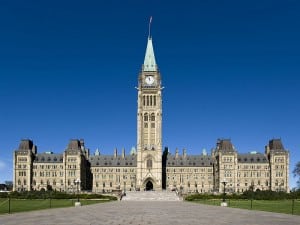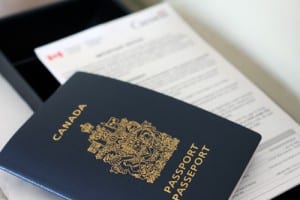 On Friday, the federal government introduced Bill C-51, the Anti-terrorism Act 2015, which will dramatically expand the powers of Canada’s national security agencies and violate the rights of Canadians without making us demonstrably safer. The Prime Minister admitted that he doesn’t know whether these new legal measures could have prevented the recent tragic killings in Ottawa and Québec. That is no surprise, as there is no credible evidence that giving more power to spies is necessary as a result of those attacks. But the government proposes to expand the power of national security agencies anyway – despite the fact that they are so terribly lacking in accountability and transparency.
On Friday, the federal government introduced Bill C-51, the Anti-terrorism Act 2015, which will dramatically expand the powers of Canada’s national security agencies and violate the rights of Canadians without making us demonstrably safer. The Prime Minister admitted that he doesn’t know whether these new legal measures could have prevented the recent tragic killings in Ottawa and Québec. That is no surprise, as there is no credible evidence that giving more power to spies is necessary as a result of those attacks. But the government proposes to expand the power of national security agencies anyway – despite the fact that they are so terribly lacking in accountability and transparency.
Simply put: this bill will give even more extraordinary and draconian powers to national security agencies, without evidence that this will enhance public safety and with no appropriate accountability and review mechanisms to curb the practically inevitable abuses of these sweeping powers. The BC Civil Liberties Association is gravely concerned by the provisions in Bill C-51, and we believe Canadians should be too.
Here are just a few provisions of the new bill that Canadians should be deeply concerned about:
The bill makes it easier to throw people in jail without charge or even a suspicion of criminal activity, expanding the power of “preventive detention.”
The new measures would let law enforcement agencies arrest someone if they think a terrorist act “may be carried out” instead of the current standard of “will be carried out.” They would also increase the period of preventive detention from three days to seven days.
 The expansion of police powers to detain people without charges must be examined with the utmost scrutiny. Preventive detention permits holding an individual without charges based on mere suspicion of dangerousness. It is necessarily based on guess work, because if there were grounds to lay charges for a criminal offence – and by the way, you can be charged for even planning a criminal offence, that’s called conspiracy – a suspected individual could be detained under the usual criminal law procedures. The three-day preventive detention power with the current legal threshold to trigger it has never been used. Advocates for preventive detention says this shows that law enforcement was appropriately restrained in the use of this extraordinary power. We say this is evidence that such sweeping powers are simply unnecessary, and we ask: if three-day preventive detention has never been used, why on earth would we extend it to seven days?
The expansion of police powers to detain people without charges must be examined with the utmost scrutiny. Preventive detention permits holding an individual without charges based on mere suspicion of dangerousness. It is necessarily based on guess work, because if there were grounds to lay charges for a criminal offence – and by the way, you can be charged for even planning a criminal offence, that’s called conspiracy – a suspected individual could be detained under the usual criminal law procedures. The three-day preventive detention power with the current legal threshold to trigger it has never been used. Advocates for preventive detention says this shows that law enforcement was appropriately restrained in the use of this extraordinary power. We say this is evidence that such sweeping powers are simply unnecessary, and we ask: if three-day preventive detention has never been used, why on earth would we extend it to seven days?
Stripping an individual’s liberty where no criminal offence is committed – or where no offence is even suspected to have been committed – runs against the most basic principles of fundamental justice and, in our opinion, is unconstitutional.
The bill makes it easier for innocent Canadians to wind up on Canada’s no-fly list.
The bill would allow the government to lower the standard for inclusion on the no-fly list and add to the no-fly list anyone it believes might be travelling to engage in terrorism.
“Listing” is inh erently problematic because it is based on secret intelligence and allegations against individuals that– being secret – are nearly impossible for any individual to challenge. Recently the federal US court in Oregon struck down the American procedure for an individual to challenge their inclusion on its no-fly list for the very reason that they cannot have access to the secret evidence against them. This American court found the no-fly list challenge process to be not only unconstitutional but “wholly ineffective.”
erently problematic because it is based on secret intelligence and allegations against individuals that– being secret – are nearly impossible for any individual to challenge. Recently the federal US court in Oregon struck down the American procedure for an individual to challenge their inclusion on its no-fly list for the very reason that they cannot have access to the secret evidence against them. This American court found the no-fly list challenge process to be not only unconstitutional but “wholly ineffective.”
Canadian courts have recognized the practice of “listing” as Kafkaesque, something Canadians such as Abousfian Abdelrazik know only too well. He wound up on a UN list while we was outside Canada, and his lawyers spent over a year in court before he was allowed to return home. The UN subsequently “de-listed” him without giving any real reasons. Secret criteria, secret processes – all a violation of fundamental fairness with genuine and serious consequences for the people caught in the web. And as for safety, think about it: supposedly too dangerous to fly, but not too dangerous to go the mall, walk into a school, go to a hockey stadium? There is simply no logic to the program.
No-fly lists are notoriously flawed, hurt innocent people, and have no demonstrable effect on safety.
The bill guts important privacy protections and will allow a dangerous level of information-sharing among government agencies.
The Bill includes a provision to allow for sweeping disclosures of government-held information in the name of national security. Prior to the bill’s introduction, the example constantly cited was the disclosure of passport information to national security agencies. Let’s just unpack this one example.
 When facial-recognition-ready photographs became a requirement for passports, Canadians were assured that this was to guard against fraud (for example, having two passports in different names). Now, with the new bill’s information-sharing provision, Canada’s administrative photo bank could be turned over to police and national security to act as a population-wide database of mug shots, programmable for facial recognition.
When facial-recognition-ready photographs became a requirement for passports, Canadians were assured that this was to guard against fraud (for example, having two passports in different names). Now, with the new bill’s information-sharing provision, Canada’s administrative photo bank could be turned over to police and national security to act as a population-wide database of mug shots, programmable for facial recognition.
Right now, it’s not legal for government agencies to disclose your personal information indiscriminately. Governments are not supposed to be piecing together information about you and your interactions with government agencies in order to learn more about who you are, your habits, your relationships, your health and so forth. That is a significant violation of privacy rights. This bill would make it possible for government departments to disclose personal information about individuals – including people who have no connection to terrorist activities – in order detect new security threats. There are important reasons we don’t allow governments to compile and disclose information about us, and this bill disregards them – without any convincing evidence as to why that will make Canadians safer. The Privacy Commissioner of Canada has expressed concern.
The bill makes criminals of people who supposedly “promote” terrorism but who have neither committed nor plan to commit any criminal or violent act.
It is already illegal to counsel or actively encourage someone to commit a specific terrorism offence. Bill C-51 would broaden that to ban the promotion of terrorism or intentional advocacy of it more generally.
As the world joins in solidarity to stand firm on the democratic necessity of free speech, Canada has announced its plans to criminalize words and sentiments in the misguided notion that this will make us safer. We will not be safer. We will be less free, less democratic, and less likely to know who to keep an eye on, because the people we might be concerned about won’t be discussing their troubling views.
 This bill could also make a criminal out of any person who, for whatever reason, spouts off on social media in support of some awful violent event or another, whether in Canada or abroad — even if that individual has neither committed nor planned any criminal action. Simply saying that you support whatever happened would be enough to make you a criminal. As reprehensible as it might be to make statements in support of violence, it should not be a crime just to sit at home and write about it on Facebook without any intention to act violently or to incite others.
This bill could also make a criminal out of any person who, for whatever reason, spouts off on social media in support of some awful violent event or another, whether in Canada or abroad — even if that individual has neither committed nor planned any criminal action. Simply saying that you support whatever happened would be enough to make you a criminal. As reprehensible as it might be to make statements in support of violence, it should not be a crime just to sit at home and write about it on Facebook without any intention to act violently or to incite others.
Moreover, the breadth of bill’s definition of terrorism and jeopardizing the security of Canada can only create a significant chill on legitimate political speech.
It seems highly likely to the BCCLA that this aspect of the bill is unconstitutional.
The bill is too big.
Bill C-51 makes massive changes to many aspects of Canada’s spying and security system. Any one of the changes – making it easier to lock people up without charge; criminalizing expression; vastly expanding the powers of Canada’s spies; gutting privacy protections – is significant, raises constitutional questions, and must be the subject of serious debate. Lumping them all together into one bill, and proposing to speed that bill through Parliament, virtually guarantees that democratic debate on these proposed measures will be insufficient. This bill should be split up into many smaller pieces and debated properly, and individually.
The bill repeats the mistakes of history.
The Canadian Security Intelligence Service (CSIS) was created in the early 1980s after an inquiry into the illegal activities and civil rights abuses of the RCMP, which originally also acted as Canada’s intelligence-gathering service. The RCMP at the time was engaged in repeated lawbreaking as it tried to interfere with the activities of groups that it targeted – for example, Québec separatists. This kind of undemocratic activity was so shocking that a commission of inquiry recommended that the power to conduct espionage and intelligence gathering be taken away from the RCMP, and that policing and intelligence gathering be separated in order to prevent future foul play by Canadians spies. Now, CSIS is being given extraordinary new police-like powers to “disrupt” the activities of suspected terrorists, instead of leaving those powers in the hands of police, without extending appropriate supervision and oversight to CSIS in exercising this new authority. While warrants will be required for disruption activities, there remains a significant problem in that CSIS’ oversight mechanism is ill-equipped to properly review the agency’s growing mandate.
Let us be clear – the government has presented absolutely no policy rationale, nor any evidence, to demonstrate why CSIS’s mandate should be expanded. After much study and an entire commission of inquiry, much controversy , and the hard lessons of serious law-breaking and abuses committed in the name of “national security,” Canada decided to appropriately contain the powers of the newly created CSIS. This was deliberate. Now, the government seeks to up-end the approach of necessary constraint and license a de facto ‘secret police’ with a minimum of public discussion. The BCCLA opposes this expansion of powers, not least because there is no demonstrated need for them and a demonstrated history of their abuse.
As Canadians learn more through last week’s Snowden revelations about Canada’s activities in mass electronic spying, we know that what we need is transparency and accountability in the use of CSIS and CSEC’s existing, extraordinary powers. Instead, the government wants to give our spy agencies unprecedented new powers, without doing anything about the shameful lack of oversight of our national security agencies. As we have been saying for years, and as we argue in our lawsuit against Canada’s mass online surveillance activities, the public interest – and the protection of the rights of Canadians – demands that Canada’s spy agencies have strong oversight mechanisms.
We expect to provide more detailed analysis of Bill C-51 as this debate continues. However, we are confident in saying that Bill C-51’s radical expansion of national security powers is not sound security policy and presents a real danger to Canadians.
Reasons to worry about the new, unnecessary anti-terror bill
Simply put: this bill will give even more extraordinary and draconian powers to national security agencies, without evidence that this will enhance public safety and with no appropriate accountability and review mechanisms to curb the practically inevitable abuses of these sweeping powers. The BC Civil Liberties Association is gravely concerned by the provisions in Bill C-51, and we believe Canadians should be too.
Here are just a few provisions of the new bill that Canadians should be deeply concerned about:
The bill makes it easier to throw people in jail without charge or even a suspicion of criminal activity, expanding the power of “preventive detention.”
The new measures would let law enforcement agencies arrest someone if they think a terrorist act “may be carried out” instead of the current standard of “will be carried out.” They would also increase the period of preventive detention from three days to seven days.
Stripping an individual’s liberty where no criminal offence is committed – or where no offence is even suspected to have been committed – runs against the most basic principles of fundamental justice and, in our opinion, is unconstitutional.
The bill makes it easier for innocent Canadians to wind up on Canada’s no-fly list.
The bill would allow the government to lower the standard for inclusion on the no-fly list and add to the no-fly list anyone it believes might be travelling to engage in terrorism.
“Listing” is inh erently problematic because it is based on secret intelligence and allegations against individuals that– being secret – are nearly impossible for any individual to challenge. Recently the federal US court in Oregon struck down the American procedure for an individual to challenge their inclusion on its no-fly list for the very reason that they cannot have access to the secret evidence against them. This American court found the no-fly list challenge process to be not only unconstitutional but “wholly ineffective.”
erently problematic because it is based on secret intelligence and allegations against individuals that– being secret – are nearly impossible for any individual to challenge. Recently the federal US court in Oregon struck down the American procedure for an individual to challenge their inclusion on its no-fly list for the very reason that they cannot have access to the secret evidence against them. This American court found the no-fly list challenge process to be not only unconstitutional but “wholly ineffective.”
Canadian courts have recognized the practice of “listing” as Kafkaesque, something Canadians such as Abousfian Abdelrazik know only too well. He wound up on a UN list while we was outside Canada, and his lawyers spent over a year in court before he was allowed to return home. The UN subsequently “de-listed” him without giving any real reasons. Secret criteria, secret processes – all a violation of fundamental fairness with genuine and serious consequences for the people caught in the web. And as for safety, think about it: supposedly too dangerous to fly, but not too dangerous to go the mall, walk into a school, go to a hockey stadium? There is simply no logic to the program.
No-fly lists are notoriously flawed, hurt innocent people, and have no demonstrable effect on safety.
The bill guts important privacy protections and will allow a dangerous level of information-sharing among government agencies.
The Bill includes a provision to allow for sweeping disclosures of government-held information in the name of national security. Prior to the bill’s introduction, the example constantly cited was the disclosure of passport information to national security agencies. Let’s just unpack this one example.
Right now, it’s not legal for government agencies to disclose your personal information indiscriminately. Governments are not supposed to be piecing together information about you and your interactions with government agencies in order to learn more about who you are, your habits, your relationships, your health and so forth. That is a significant violation of privacy rights. This bill would make it possible for government departments to disclose personal information about individuals – including people who have no connection to terrorist activities – in order detect new security threats. There are important reasons we don’t allow governments to compile and disclose information about us, and this bill disregards them – without any convincing evidence as to why that will make Canadians safer. The Privacy Commissioner of Canada has expressed concern.
The bill makes criminals of people who supposedly “promote” terrorism but who have neither committed nor plan to commit any criminal or violent act.
It is already illegal to counsel or actively encourage someone to commit a specific terrorism offence. Bill C-51 would broaden that to ban the promotion of terrorism or intentional advocacy of it more generally.
As the world joins in solidarity to stand firm on the democratic necessity of free speech, Canada has announced its plans to criminalize words and sentiments in the misguided notion that this will make us safer. We will not be safer. We will be less free, less democratic, and less likely to know who to keep an eye on, because the people we might be concerned about won’t be discussing their troubling views.
Moreover, the breadth of bill’s definition of terrorism and jeopardizing the security of Canada can only create a significant chill on legitimate political speech.
It seems highly likely to the BCCLA that this aspect of the bill is unconstitutional.
The bill is too big.
Bill C-51 makes massive changes to many aspects of Canada’s spying and security system. Any one of the changes – making it easier to lock people up without charge; criminalizing expression; vastly expanding the powers of Canada’s spies; gutting privacy protections – is significant, raises constitutional questions, and must be the subject of serious debate. Lumping them all together into one bill, and proposing to speed that bill through Parliament, virtually guarantees that democratic debate on these proposed measures will be insufficient. This bill should be split up into many smaller pieces and debated properly, and individually.
The bill repeats the mistakes of history.
The Canadian Security Intelligence Service (CSIS) was created in the early 1980s after an inquiry into the illegal activities and civil rights abuses of the RCMP, which originally also acted as Canada’s intelligence-gathering service. The RCMP at the time was engaged in repeated lawbreaking as it tried to interfere with the activities of groups that it targeted – for example, Québec separatists. This kind of undemocratic activity was so shocking that a commission of inquiry recommended that the power to conduct espionage and intelligence gathering be taken away from the RCMP, and that policing and intelligence gathering be separated in order to prevent future foul play by Canadians spies. Now, CSIS is being given extraordinary new police-like powers to “disrupt” the activities of suspected terrorists, instead of leaving those powers in the hands of police, without extending appropriate supervision and oversight to CSIS in exercising this new authority. While warrants will be required for disruption activities, there remains a significant problem in that CSIS’ oversight mechanism is ill-equipped to properly review the agency’s growing mandate.
Let us be clear – the government has presented absolutely no policy rationale, nor any evidence, to demonstrate why CSIS’s mandate should be expanded. After much study and an entire commission of inquiry, much controversy , and the hard lessons of serious law-breaking and abuses committed in the name of “national security,” Canada decided to appropriately contain the powers of the newly created CSIS. This was deliberate. Now, the government seeks to up-end the approach of necessary constraint and license a de facto ‘secret police’ with a minimum of public discussion. The BCCLA opposes this expansion of powers, not least because there is no demonstrated need for them and a demonstrated history of their abuse.
As Canadians learn more through last week’s Snowden revelations about Canada’s activities in mass electronic spying, we know that what we need is transparency and accountability in the use of CSIS and CSEC’s existing, extraordinary powers. Instead, the government wants to give our spy agencies unprecedented new powers, without doing anything about the shameful lack of oversight of our national security agencies. As we have been saying for years, and as we argue in our lawsuit against Canada’s mass online surveillance activities, the public interest – and the protection of the rights of Canadians – demands that Canada’s spy agencies have strong oversight mechanisms.
We expect to provide more detailed analysis of Bill C-51 as this debate continues. However, we are confident in saying that Bill C-51’s radical expansion of national security powers is not sound security policy and presents a real danger to Canadians.
CIVIL LIBERTIES CAN’T PROTECT THEMSELVES